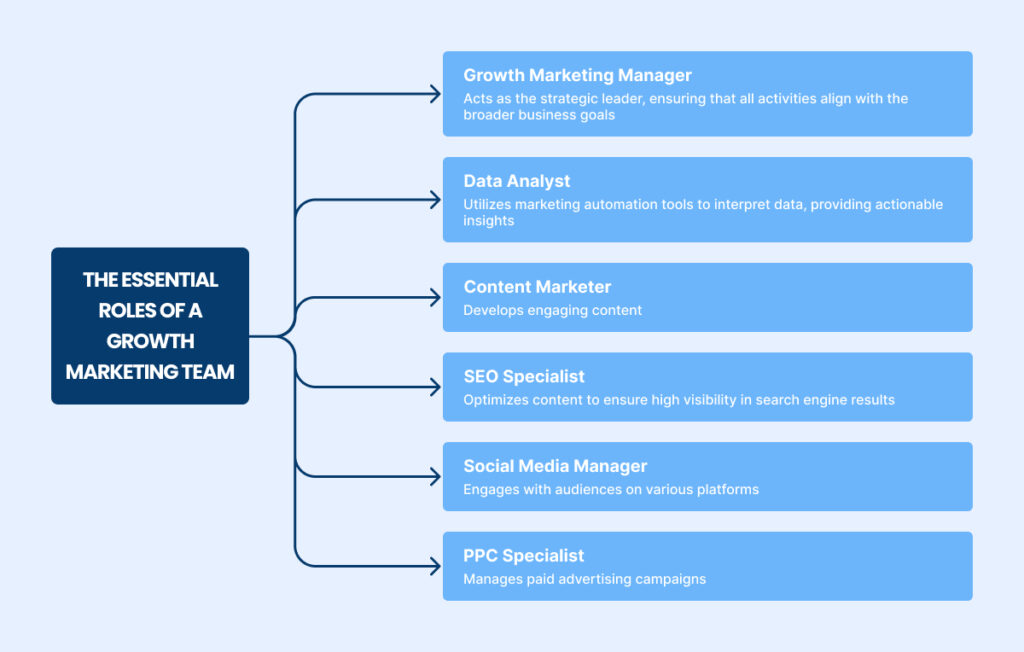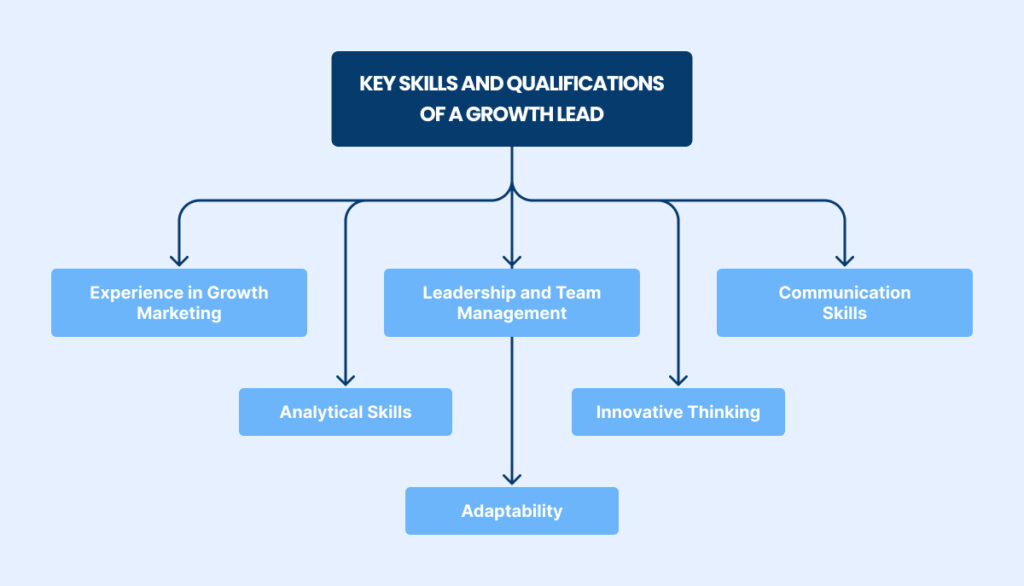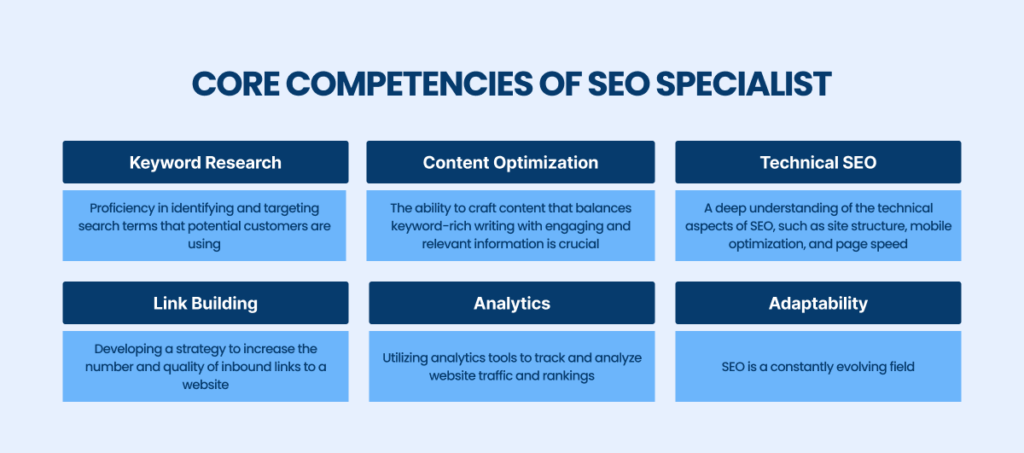Growth marketing is critical in shaping our daily experiences in today’s digital world.
It attracts customers and smartly engages and keeps them, integrating brands smoothly into our everyday lives.
Growth marketing uses data and creativity to make ads and emails personal and timely.
It affects everything from the coffee we drink to the apps we use daily. Indeed, it shapes our choices and profoundly impacts what we buy and use.
Source: Statista
A growth marketing agency is crucial for businesses that continuously attract, engage, and retain customers by leveraging innovative, data-driven strategies. Due to their specialized approach, they not only drive sustainable growth but also ensure that companies keep relevant and competitive in rapidly changing markets.
The blog post will introduce several crucial aspects of assembling a successful growth marketing team, stressing the specific roles necessary for a comprehensive team.
What is Growth Marketing?
Growth marketing is an innovative approach that goes beyond traditional marketing strategies. It focuses on attracting customers and actively engaging and retaining them through continuous experimentation and data-driven tactics.
Statista stated that digital advertising is projected that by 2027, the spending would reach 870.85 billion dollars.
Source: Statista
Unlike standard marketing efforts, which often focus on a single conversion point, growth marketing revolves around the entire funnel, leveraging a mix of channels, tools, and techniques to foster sustainable growth.
Growth marketing agencies specialize in data-driven strategies and experimentation to acquire and retain customers. This method is dynamic, adjusting in real-time to customer interactions and behaviors to optimize results and drive effective growth.
Importance of Assembling a High-Performing Team
Building a high-performing growth marketing team is critical for companies aiming to excel in today’s highly competitive markets, especially startups and growth-oriented businesses. The structure of a growth marketing team often includes a variety of specialized roles that work in concert to implement and fine-tune marketing strategies effectively.
Key positions typically include a growth marketing manager, who oversees the team’s vision and strategic direction, and a growth marketing consultant, who provides external expertise and innovative insights.
How to Understand the Core Roles in a Growth Marketing Team
Understanding the core roles in a growth marketing team is essential for driving startup growth and optimizing content marketing for startups.
Each team member brings a specific set of skills that, when combined, create a dynamic force capable of pushing the boundaries of traditional marketing.

Each role within the marketing team is interdependent, contributing to a holistic marketing approach that leverages creativity and analytics. Moreover, a growth marketing consultancy is a specialized firm that helps businesses achieve sustainable and exponential growth through data-driven marketing strategies.
By utilizing a mix of expertise, startups can productively navigate the complexities of the digital landscape, using advanced marketing automation tools and strategies recommended by seasoned growth marketing consultancies.
This integrated approach accelerates growth and builds a solid foundation for sustainable success.
Growth Lead
The Growth Lead is pivotal in the growth marketing team structure, orchestrating the development and execution of innovative marketing strategies that drive customer acquisition and retention.
This individual is often seen as the architect of the team’s success, integrating various functions and ensuring all marketing plan elements align with the company’s growth objectives.
Responsibilities and Expectations
The growth lead’s primary responsibility is establishing and guiding the high-performing marketing team toward achieving measurable results.
They are crucial in setting the strategic direction, coordinating efforts across different channels, and ensuring that all marketing activities contribute effectively to the company’s overall goals.
Key duties include:
- Strategic Planning: Develop comprehensive marketing strategies that leverage the strengths of the growth marketing team and align with business objectives.
- Team Leadership and Coordination: The Growth Lead leads by example and manages and motivates the team, fostering a culture of innovation and continuous improvement.
- Performance Monitoring: Regularly review team performance against key performance indicators (KPIs) and adjust strategies to maximize effectiveness.
- Budget Management: Allocating resources and managing budgets to ensure optimal use of funds for marketing campaigns.
- Collaboration with Other Departments: Working closely with product, sales, and customer service teams to guarantee a cohesive market expansion and customer retention approach.
- Innovation Management: Continually seeking and implementing new technologies and innovative marketing strategies to move ahead of market trends and competitors.
Key Skills and Qualifications
The role of a Growth Lead requires a blend of strategic thinking, leadership skills, and technical expertise.

The Growth Lead’s role is foundational in shaping the growth marketing team structure, driving the implementation of innovative strategies, and ensuring the team’s actions align with long-term business goals.
This leadership position requires a strategic and analytical mind and a hands-on approach to guide the team through the complexities of modern marketing landscapes.
By fulfilling these responsibilities and leveraging their skills, a Growth Lead can significantly impact the success and scalability of their organization, fostering an environment where a growth marketing team thrives and excels.
Data Analyst
Within a growth marketing team structure, the Data Analyst is the cornerstone of data-driven decision-making, ensuring that every strategic move is backed by solid evidence and insightful analysis.
Check Our Ultimate Growth Marketing Glossary
Source: Statista
This role transforms raw data into actionable insights that power all marketing decisions, from tactical campaign adjustments to strategic pivots in overall marketing approaches.
Role in Data-Driven Decision Making
The Data Analyst’s primary role involves sifting through complex data sets to identify trends, measure performance, and predict future outcomes. Their expertise is crucial for optimizing marketing strategies to drive better results in a growth marketing team.
By analyzing customer behaviors, campaign outcomes, and market trends, Data Analysts provide the quantitative backing needed for informed decision-making. This role extends beyond mere number crunching to include interpreting data in the context of broader business objectives, thereby guiding the growth marketing teams toward more effective engagements and initiatives.
Managing marketing automation tools is another significant aspect of the Data Analyst’s responsibilities.
Source: Markets and Markets
These tools often generate vast amounts of data that can be overwhelming without the right skills to filter and interpret this information. Data Analysts utilize these tools to streamline data collection, analysis, and reporting, thereby enhancing efficiency and effectiveness across the team.
Their ability to configure and manipulate these tools to suit specific team needs makes them invaluable in any successful marketing team.
Essential Analytical Skills
To excel in their role, Data Analysts must possess comprehensive analytical skills. These include:
- Statistical Analysis: Proficiency in statistical methods helps Data Analysts make sense of large datasets, discern patterns, and validate assumptions about campaigns and customer behavior.
- Predictive Analytics: Using historical data to predict future trends is crucial for planning and optimizing marketing strategies. This skill is vital for proactive growth marketing teams looking to stay ahead of market dynamics.
- Data Visualization: Translating complex data findings into understandable visual formats is essential for communicating insights across the team and stakeholders.
Effective data visualization aids in quicker decision-making and can more convincingly articulate the impact of data-driven strategies. - Critical Thinking: Being able to approach problems logically and evaluate information objectively allows Data Analysts to provide more accurate and impactful insights.
- Technical Proficiency: Understanding of programming languages such as SQL, Python, or R and familiarity with analytics platforms and databases are crucial for manipulating large data sets and performing complex analyses.
- Problem-solving: The capacity to identify issues, analyze problems, and devise efficient solutions is fundamental in a role often encountering diverse and challenging datasets.
Data Analysts are integral to the growth marketing team structure, providing the expertise needed to navigate the increasingly data-driven landscape of modern marketing. Their insights optimize current campaigns and shape future strategies, making their role indispensable in growth marketing consultancies and agencies.
As team members who bridge the gap between raw data and strategic execution, their analytical prowess ensures that the marketing team’s efforts are efficient and aligned with overarching business goals.
SEO Specialist
The SEO specialist has a vital role in the architecture of a growth marketing team, particularly in driving organic growth—a crucial component of any comprehensive growth marketing strategy.
As businesses increasingly pivot towards digital platforms, the importance of mastering search engine optimization (SEO) has become more pronounced, not just as a skill but as a critical operational necessity.
Importance in Driving Organic Growth
SEO is fundamental in today’s digital marketing landscape. It increases visibility and traffic and enhances the user experience, making it a cornerstone of successful marketing teams.
Source: Semrush
An SEO Specialist’s role is pivotal in harnessing this organic growth. They optimize website content to ensure it ranks well in search engine results, which is increasingly essential as the digital space becomes more crowded and competitive. Effective SEO leads to greater engagement, higher conversion rates, and increased revenue without the immediate cost of paid advertising.
Moreover, SEO contributes significantly to building long-term brand authority and trust, which are key to sustaining growth. SEO specialists directly influence how new and existing customers perceive a company’s brand by ensuring its digital presence is visible and prominent. This strategic visibility is crucial for any growth marketing team aiming to establish a strong market presence.
Core Competencies
The core competencies of an SEO Specialist encompass a wide set of technical and creative skills that are critical to developing and implementing effective SEO strategies:

Today, SEO proficiency is more crucial than ever. Businesses are keenly aware of the need for SEO Specialists within their growth marketing teams, as evidenced by the surge in demand for these professionals in job postings and career opportunities.
Being adept in SEO is not just about understanding keywords or backlinks; it’s about delivering a holistic strategy that aligns technical optimization with quality content and user experience.
Content Marketer
In digital marketing, a Content Marketer emerges as a pivotal team member within any growth marketing team structure.
Their primary role revolves around creating and distributing valuable, correspondent, and consistent content to attract and retain a clearly defined audience — ultimately, to boost profitable customer action. Given the central role of content in engaging audiences and facilitating conversions, companies need to invest in skilled Content Marketers more than ever.
Role in Engagement and Conversion
Content Marketers harness the power of storytelling to connect with audiences on a personal level, encouraging engagement through various forms of content such as blogs, videos, infographics, and social media posts.
Source: Statista
This connection is crucial in converting casual visitors into loyal customers, making the Content Marketer essential for driving growth and sustainability in the competitive digital landscape.
The importance of a Content Marketer cannot be overstated. They play a critical role in shaping the brand’s voice and messaging, ensuring consistency across all platforms. The consistency is key to building trust and recognition, which is vital to customer retention and conversion.
Source: Semrush
Additionally, content marketers use analytics tools to track user engagement and conversions, providing valuable insights that help refine strategies and content offerings to meet the audience’s needs better.
Necessity for Hiring a Content Marketer
For businesses pondering in-house marketing vs. agency or agency vs. freelancer, the decision often boils down to the specific needs and capabilities of the business.
Hiring a Content Marketer in-house allows for deeper integration with ongoing projects and immediate access, fostering a closer alignment with the company’s long-term vision and culture.
Conversely, agencies offer a broader range of services and expertise, potentially bringing a fresh perspective and innovative ideas. Freelancers can be a flexible and cost-effective solution, ideal for specific projects without a full-time commitment.
Regardless of the setup, the necessity for a Content Marketer is clear. They fill a critical gap in the growth marketing team, turning strategic insights into compelling content that drives engagement and conversions. They work closely with other team members, such as the Social Media Manager, to ensure that content is optimized for each platform and gets the widest possible audience.
Furthermore, the evolution of content marketing requires these professionals to be agile and responsive to the changing dynamics of consumer preferences and digital technologies.
Questions to Ask a Growth Agency
When considering hiring through a growth agency, there are questions to ask a growth agency. Businesses should inquire about the agency’s experience with content strategy, examples of successful campaigns, and how they measure the impact of content on overall business goals. Questions might include:
- How do you tailor content strategies to align with specific business objectives?
- Can you provide examples of content that has significantly increased engagement or conversions for similar businesses?
- What tools and metrics do you use to evaluate content performance?
These questions help businesses gauge the agency’s expertise and ensure that the partnership will effectively meet their strategic needs in the marketing agency onboarding process.
Ultimately, whether through in-house staff, an agency, or freelancers, the Content Marketer’s role is integral to the success of marketing initiatives. They contribute creatively and strategically, using their skills to bridge the gap between the brand and its target audience.
As part of a marketing dream team, Content Marketers drive forward initiatives that enhance visibility, engage users, and foster an environment where business growth is not just possible but accelerated. Their strategic input and creative output are crucial in navigating the complex web of digital interactions, making them an indispensable asset to any growth-focused organization.
Social Media Manager
Within the growth marketing team structure, the Social Media Manager has a crucial role in building and maintaining the brand’s presence and fostering interaction with the audience across various platforms.
This role is instrumental in amplifying the company’s voice and extending its reach in the digital world, where social media channels represent primary touchpoints for engaging with new and existing customers.
Building Brand Presence and Interaction
The Social Media Manager’s responsibilities involve curating content, managing postings, and engaging with users to foster a community around the brand. This professional uses strategic insight to craft messages that resonate with the target audience, ensuring that every tweet, post, and share contributes to a cohesive brand narrative.
Source: Data report
Their work is vital for enhancing brand visibility and driving engagement, critical components of successful digital marketing strategies within a growth marketing team.
Key to their role is creating content and analyzing engagement metrics to understand what resonates with the audience. The Social Media Manager uses advanced analytics tools to monitor interactions, track engagement trends, and adapt strategies in real-time to optimize performance.
This ongoing analysis allows for fine-tuning tactics to increase reach and engagement effectively.
A social media manager’s day-to-day activities include crisis management and real-time customer service, as well as swiftly handling inquiries and feedback to maintain the brand’s reputation.
This aspect of the role requires excellent communication skills and a deep understanding of the brand’s tone and ethos, ensuring that all communications strengthen customer relationships and enhance brand loyalty.
PPC Specialist
The PPC (Pay-Per-Click) Specialist is pivotal in the dynamic structure of a growth marketing team. This role focuses intensely on managing paid ad campaigns that drive immediate results.
Source: Assets global report
This role is critical because it directly influences the team’s ability to generate quick wins in terms of traffic and conversions. It uses finely tuned-advertising strategies that require a high degree of skill in budgeting and optimization.
Managing Paid Ad Campaigns
The PPC Specialist’s primary responsibility within the growth marketing team is creating, managing, and optimizing paid advertising campaigns across various platforms, including Google Ads, Facebook, and LinkedIn.
Source: Assets global report
These campaigns are essential for targeting specific market segments and delivering tailored messages that attract potential customers to the brand. This role demands a deep understanding of the nuances of each platform to leverage its unique features and reach effectively.
Key to managing these campaigns is analyzing performance data, adjusting bids, fine-tuning targeting, and experimenting with ad copy and creatives. The PPC Specialist must continuously monitor the effectiveness of the campaigns, making real-time adjustments to ensure the best return on investment (ROI). This constant iteration helps discover the most cost-effective and high-performing strategies to deploy.
Skills in Budgeting and Optimization
Budgeting is another critical area of expertise for a PPC Specialist. They are tasked with allocating the digital advertising budget in a way that maximizes campaign results while minimizing costs.
This involves a strategic distribution of funds across various campaigns and platforms, depending on their performance and the organization’s overall marketing goals.
Source: Assets global report
Making informed budgeting decisions based on comprehensive data analysis is crucial to avoid overspending and ensure that each dollar spent contributes to the growth objectives.
Optimization skills are equally important, encompassing everything from keyword selection and ad placement to audience targeting and bid management. The PPC Specialist uses advanced analytics tools to gather insights about campaign performance, informing decisions about which campaign aspects to tweak.
This could mean changing the demographics targeted, adjusting the day and time ads are run, or even revising the landing pages ads are directed to.
Partner with [A] Growth Marketing Agency
Today, we are seeing an exciting development in growth marketing. It does not just promote products but builds a lasting base for rapid business growth.
Partnering with [A] Growth Agency can be a strategic move for businesses looking to accelerate their growth. We specialize in turning entrepreneurial dreams into reality with effective, tailored growth strategies.
Our core mission is to scale businesses and implement effective growth strategies. We believe in the power of data-driven approaches to transform businesses. Moreover, every business we work with is a partner. We’re invested in their success as deeply as our own, fostering a mutual growth journey.
If this attracts you, then don’t hesitate!

